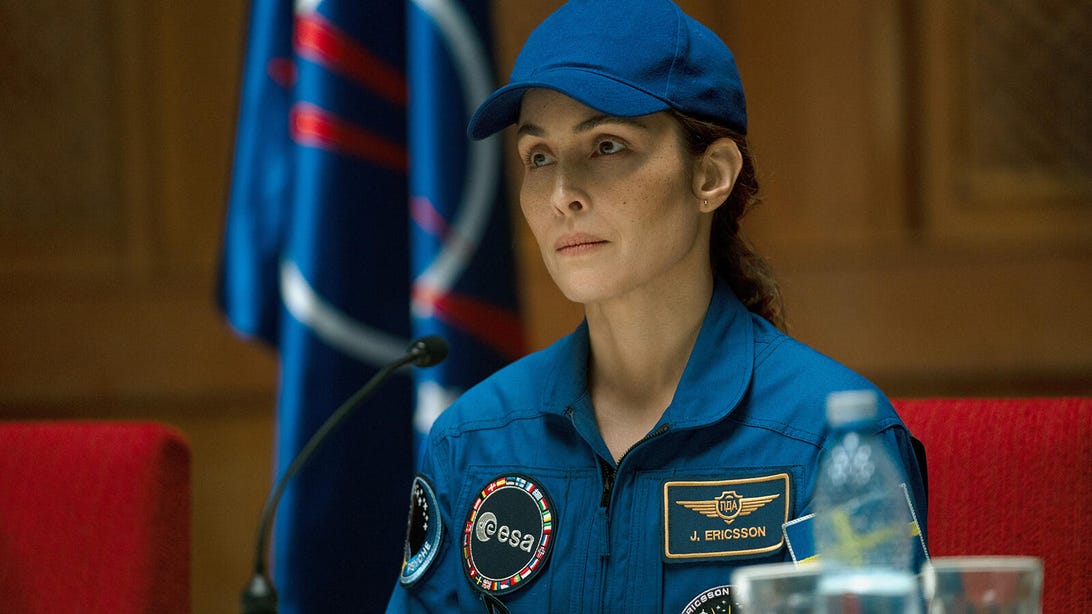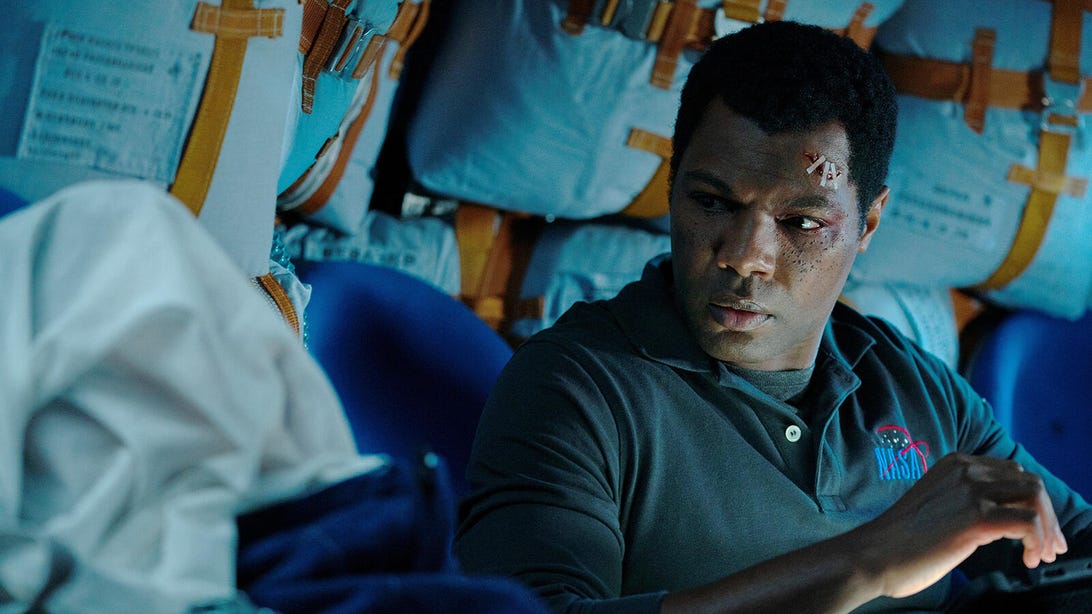Join or Sign In
Sign in to customize your TV listings
By joining TV Guide, you agree to our Terms of Use and acknowledge the data practices in our Privacy Policy.
Apple TV+'s Constellation Taps Into the Eternal Appeal of Conspiracy Thrillers
The sci-fi series wraps a standard premise in a fantastically paranoid atmosphere

Noomi Rapace, Constellation
Apple TV+[The following contains spoilers for Constellation Episode 6, "Paul Is Dead."]
To genre-savvy viewers, Constellation's defining sci-fi mystery is not particularly mysterious. The real draw lies in the show's encroaching undercurrent of paranoia, spinning a slightly goofy premise into a psychological thriller about a woman losing her grip on reality.
After a disastrous accident on the International Space Station, astronaut Jo Ericsson (Noomi Rapace) returns home to an uncertain welcome. Her husband is behaving strangely. She misremembers key details from her day-to-day life. Most worryingly of all, when she submits her report on why her crew had to evacuate the ISS, she describes a very different scenario from her colleagues. Speaking to an international committee, she recounts an alarming tale about a dead Soviet cosmonaut colliding with the station, a collision that nobody else witnessed or caught on camera. It sounds very much like a hypoxia-induced hallucination.
Thanks to some heavy hints about quantum physics experiments and government cover-ups (not to mention stuff like Jo's car inexplicably changing color while she was in space), we can quickly infer that Jo has landed in a parallel universe. But Constellation's appeal has less to do with its sci-fi trappings than its deliciously tense storytelling, creating a scenario where the entire world seems to be gaslighting the main character.
Echoing 1970s conspiracy thriller movies like The Parallax View, Jo Ericsson is a classic brand of paranoid protagonist. Previously backed by her supportive husband (James D'Arcy) and a team of trusted colleagues, she begins to realize that every aspect of her life is now slightly… off. Even her 10-year-old daughter (played by twins Rosie and Davina Coleman) treats her differently. Of course, everyone else thinks Jo is the one acting weird. From their perspective she's displaying symptoms of a rare but treatable form of space-induced psychosis.
It's a perfect role for Noomi Rapace, an actor who thrives on offbeat genre projects, and whose gaunt features and wild eyes add an extra level of disharmony to Jo's breakdown. We know she's right to be suspicious about her surroundings, but you can't exactly blame other characters for doubting her. Which is, of course, the basis for numerous female-led psychological thrillers, from Rosemary's Baby to the Elisabeth Moss remake of The Invisible Man, dramatizing relatable fears about women being controlled and manipulated by patriarchal authorities.
Episodes 5 and 6 are where these themes really come to a head, leaning into the zanier world-building and giving us an entire episode from Jo's original universe — a world where "she" died in space, while her colleague, Paul (William Catlett), returned to Earth. In the show's main timeline, Paul died in Episode 1.
Referencing the vintage Beatles conspiracy theory "Paul is Dead," Episode 6 reveals that the surviving versions of Paul and Jo have swapped universes. They also exhibit noticeably different reactions to their circumstances. Both were trapped on a damaged space station with a teammate's corpse, and both have experienced eerie paranormal phenomena: ghostly visions that permeate the barrier between universes. But while Jo was slow on the uptake, Paul — a man from an American military background — channels his guilt and stress into anger, with a more proactive attitude to seeking the truth. He approaches the problem like an investigator, slotting himself into a subtly different subgenre than Jo's descent into conspiratorial thinking.

William Catlett, Constellation
Apple TV+Over in the main universe, Jo reaches her breaking point midway through the season. Discovering that her workplace-prescribed "vitamin supplements" are actually the psychiatric drug lithium, she stops taking her meds, knocks out her husband, kidnaps her daughter, and drives halfway across Europe to visit a couple of space-obsessed conspiracy theorists. These people believe they can hear secret messages in vintage radio recordings, offering proof that Jo isn't the first astronaut to travel between universes.
Unfortunately, those messages aren't easy to decipher, reflecting the wishful thinking behind blurry amateur photos of Bigfoot and UFOs. "You must really want to listen," explains one of the conspiracy theorists. "You have to train your ears."
"It really could be anything," argues Jo's daughter, nervously attempting to be the voice of reason. This tension between skepticism and faith is the fuel behind many great conspiracy thrillers — and indeed The X-Files, a show with more than a little in common with Constellation. Stories like this tread a fine line, turning real-life examples of mental illness and mass delusion into heroic underdog adventures. When Jo goes off her meds and destroys her career, we root for her because in this emphatically fictional setting, we know she's in the right.
The paranoia thriller's heyday landed squarely in the 1970s, overlapping with Cold War politics and the Watergate scandal. Audiences had immediate reasons to distrust the government and be intrigued by new surveillance technology. It doesn't feel like a coincidence that Constellation involves a Soviet-era backstory, helmed by an aging duo of former astronauts played by Jonathan Banks and Barbara Sukowa. They're keen to keep a lid on the idea of astronauts traveling between dimensions.
Blending science and magic, it's a far more elaborate concept than "real" space-related conspiracy theories about UFO cover-ups and the moon landing, placing Constellation firmly in the realm of escapist entertainment. Hinging on Jo's emotional breakdown, it offers all the psychological tension of a classic conspiracy thriller, but none of the political relevance. Looking at current attitudes to conspiratorial thinking, you can understand why Constellation's writers went this route.
At present, paranoid conspiracy theories are endemic in mainstream culture. Political debates are rife with anti-vaccine sentiments and toxic fantasies about secret government cabals. Regular people have been cheerfully speculating about a British princess being replaced by a body double. You can't spin this stuff into a fictionalized thriller without navigating a ton of unpleasant baggage. So Constellation thrives by adopting an overtly fantastical — and apolitical — idea and playing it straight. Noomi Rapace's intensity carries it off, and within a couple of episodes you're down the rabbit hole of a story that might otherwise feel very silly indeed.
The season finale of Constellation streams Wednesday, March 27 on Apple TV+.